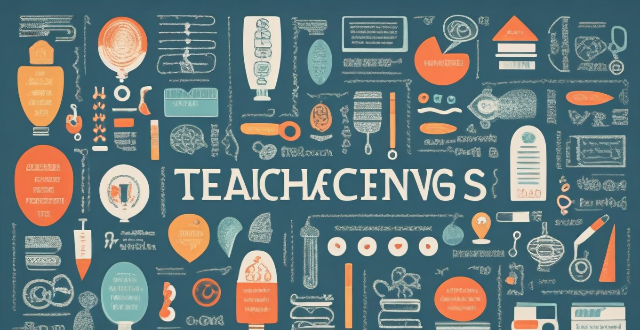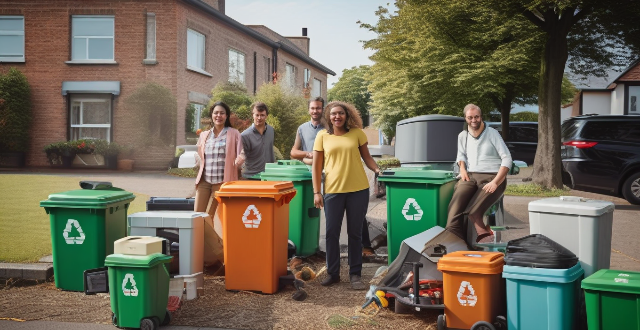Teaching Program

What role does collaborative learning play in innovative teaching approaches ?
The text discusses the importance of collaborative learning in innovative teaching approaches, emphasizing how it enhances student engagement, promotes critical thinking, develops communication skills, encourages autonomy and self-direction, and fosters teamwork and leadership skills.

How can teachers effectively integrate multimedia resources into their innovative teaching methods ?
Integrating multimedia resources into teaching methods can greatly enhance the learning experience for students. Teachers should identify learning objectives, choose appropriate tools, create interactive lessons, encourage student participation, integrate technology in assessments, provide access to online resources, and continuously evaluate and update their methods. This approach ensures that teaching remains innovative and engaging for students.

What are the benefits of teaching children about climate change ?
Teaching children about climate change is crucial for their future, empowering them to take action and make a difference. It enhances their awareness, critical thinking skills, environmental stewardship, innovation, preparation for future careers, empathy, responsibility, healthy habits, resilience, and interest in science and technology. This education can lead to informed decision-making, problem-solving abilities, responsible behavior towards the environment, and a sense of global citizenship. By teaching children about climate change, we are preparing them to confront one of the most significant challenges facing our planet.

How can artificial intelligence be integrated into classroom teaching ?
Artificial intelligence (AI) can revolutionize classroom teaching by enhancing student engagement, personalizing learning experiences, and improving educational outcomes. Adaptive learning systems create personalized learning pathways and provide real-time feedback, while intelligent tutoring systems offer individualized coaching and progress tracking. Automated grading and assessment streamline the evaluation process, virtual learning assistants provide round-the-clock support, and data analytics tools inform instructional decisions. AI-powered group projects and peer feedback mechanisms facilitate collaborative learning environments. Integrating AI into classroom teaching has the potential to transform education by creating more engaging, personalized, and efficient learning experiences for all students.

What are the key factors to consider when choosing an international school or program ?
When selecting an international school or program, consider factorsWhen selecting an international school or program, consider factorsation and reputation, curriculum and extracurricular activities and opportunities for internships or study abroad, cultural diversity and inclusivity, location and facilities, and cost and financial aid options. These considerations can help ensure that the chosen institution aligns with your academic goals and personal preferences, fostering both academic success and personal growth.

How can I improve my teaching skills as a fitness instructor ?
This article provides tips on how to improve teaching skills as a fitness instructor. It suggests developing knowledge of fitness and exercise science, enhancing communication skills, creating engaging workouts, and continuously evaluating and improving teaching methods. The article emphasizes the importance of staying up-to-date with current research and best practices, practicing active listening and empathy, designing well-rounded fitness programs, fostering a supportive community within classes, seeking feedback from clients, and reflecting on one's own performance. By following these tips, fitness instructors can provide higher quality service to their clients and achieve better client outcomes.

What are some innovative teaching methods that can enhance student engagement ?
Innovative teaching methods, including Project-BasedInnovative teaching methods, including Project-Basedroom, Gaming and Simulation Gaming and Simulations, Peer Teaching and Tutoring, Technology Integration, and Service Learning, are designed to enhance student engagement by fostering critical thinking, problem-solving, collaboration, and real-world application of knowledge. These approaches aim to make learning more interactive, relevant, and enjoyable for students, ultimately contributing to their academic success and personal growth.

Can you discuss the impact of personalized learning on innovative teaching methods ?
Personalized learning, an educational approach that tailors instruction to individual students' needs and preferences, has significantly influenced innovative teaching methods. This approach emphasizes a student-centered learning environment, flexible use of technology and space, and data-driven decision making. As a result, teaching methods have evolved to include differentiated instruction, mastery-based assessments, self-directed learning opportunities, and the integration of technology. These changes aim to create a more engaging, effective, and personalized educational experience for each student, fostering deeper understanding and higher retention rates.

What are the best practices for teaching children about money management and savings ?
Teaching children about money management and savings is an essential life skill that can help them develop good financial habits. Here are some best practices for teaching children about money management: 1. Start early: Even toddlers can understand basic concepts like saving and spending. Use everyday opportunities to talk about money and its value. 2. Lead by example: Children learn by example, so it's important to model good financial habits yourself. Show them how you budget, save, and make decisions about spending. 3. Use allowances wisely: Giving your child an allowance is a great way to teach them about money management. Encourage saving, teach spending, and introduce giving as part of their allowance. 4. Play money games: Board games and online games can be fun and educational at the same time. Some popular ones include Monopoly, The Game of Life, and PiggyBot. 5. Involve them in family finances: Involving your children in family finances can help them understand the real-world implications of money management. Have them help you create a budget, go grocery shopping with you, and talk to them about bills and expenses. Remember to be patient, consistent, and positive when teaching children about money management and savings. With these best practices, your child will develop good financial habits that will serve them well throughout their life.

What are some innovative methods for teaching climate change in schools ?
Innovative Methods for Teaching Climate Change in Schools Climate change is a pressing issue that requires innovative approaches to teaching. Here are some methods that can help engage students and promote critical thinking: 1. Interdisciplinary Learning 2. Project-Based Learning (PBL) 3. Service Learning 4. Technology Integration 5. Inquiry-Based Learning 6. Field Trips and Experiential Learning

What should I look for in a school's extracurricular activities program ?
When considering a school's extracurricular activities program, look for diversity of options, quality leadership, opportunities for growth and development, and inclusivity and accessibility. A well-rounded program will foster personal growth, leadership skills, and community among participants.

How does the iPhone recycling program work ?
The iPhone Recycling Program, offered by Apple Inc., allows customers to recycle their old iPhone devices in an environmentally friendly manner. The process involves gathering all components of the old iPhone, visiting an Apple Store or authorized service provider, handing over the device for inspection and receipt, and sending it to a recycling facility where its materials are separated and recycled into new products. Participating in the program helps reduce electronic waste, conserve resources, and offers discounts on new devices.

How can schools incorporate cultural diversity into their curriculum ?
Incorporating cultural diversity into the school curriculum is essential for fostering a more inclusive and understanding environment. Here are some ways schools can do so: 1. Multicultural Education Programs: Schools can introduce multicultural education programs that focus on teaching students about different cultures, traditions, and beliefs. This can include historical context, cultural celebrations, and guest speakers from diverse backgrounds. 2. Diverse Textbooks and Teaching Materials: Using textbooks and teaching materials that represent a variety of cultures, races, and religions can help students understand and appreciate diversity. This can include books written by authors from different cultural backgrounds, multicultural stories, and visual representation of people from different cultures. 3. Language Learning Programs: Providing language learning programs can help students gain a deeper understanding of other cultures. This can include foreign language classes, cultural exchange programs, and language immersion programs. 4. Cultural Field Trips: Organizing field trips to cultural museums, festivals, and events can provide students with firsthand experiences of different cultures. This can include museum visits, cultural festivals, and local business visits. 5. Culturally Responsive Teaching Strategies: Teachers should use culturally responsive teaching strategies that take into account the unique needs and backgrounds of their students. This can include personalized learning, relevant examples, and collaborative learning between students from different cultures.

Can strength training be part of a female fitness program ?
**Can Strength Training Be Part of a Female Fitness Program?** Yes, strength training is crucial for women's fitness programs. It offers benefits such as improved muscle tone, increased metabolism, enhanced bone density, and reduced injury risk. To integrate strength training effectively: start with light weights, focus on compound movements, balance it with cardio workouts, and consider professional guidance for personalized plans. This approach ensures a comprehensive and beneficial fitness regimen for women.

What are the key elements of a quality preschool program ?
**Key Elements of a Quality Preschool Program** A high-quality preschool program focuses on the overall development of children, incorporating various elements that support their growth. These include: 1. **Curriculum Design**: - Developmentally appropriate practices. - Integrated learning across domains. - Play-based learning activities. 2. **Qualified Educators**: - Certified teachers with early childhood education credentials. - Continuous professional development opportunities. 3. **Safe and Supportive Environment**: - Physical safety measures. - Emotional support from educators. 4. **Parent Involvement and Partnership**: - Open communication channels. - Opportunities for parental participation. 5. **Health and Nutrition**: - Health policies and hygiene practices. - Nutritious meals and snacks. 6. **Assessment and Evaluation**: - Ongoing observations by teachers. - Developmental screenings for children. 7. **Diversity and Inclusion**: - Culturally responsive teaching methods. - An inclusive environment for all children. 8. **Class Size and Adult-to-Child Ratio**: - Small class sizes. - Adequate supervision ratios. 9. **Curriculum Flexibility**: - Adaptable curriculum to meet changing needs. - Integration of family and community resources. 10. **Active Learning**: - Hands-on experiences. - Outdoor play opportunities. By addressing these key elements, preschool programs can provide a comprehensive and enriching experience for young children, fostering their social, emotional, cognitive, and physical development.

What are the key elements of a successful sports training program ?
A successful sports training program is essential for athletes to improve performance and achieve goals. Key elements include clear objectives, comprehensive planning, variety and progression in workouts, proper technique and form, recovery and regeneration strategies, mental toughness and focus, nutrition and hydration, and continuous assessment and adjustment. By incorporating these elements, athletes can maximize potential and minimize risk of injury and burnout.

How can you measure the effectiveness of a personal safety training program ?
Personal safety training programs are crucial for individuals to learn how to protect themselves from potential threats and hazards. However, it is equally important to measure the effectiveness of these programs to ensure that they are achieving their intended goals. Here are some ways to measure the effectiveness of a personal safety training program: 1. Assessment Tests: Before and after the training program, conduct assessment tests to gauge participants' knowledge and skills related to personal safety. These tests can include quizzes, case studies, or role-playing scenarios. Compare the results of the pre-test and post-test to determine if there has been an improvement in participants' understanding and application of safety concepts. 2. Observations: During the training sessions, observe participants' engagement levels, participation, and interactions with each other. Look for signs of active learning, such as asking questions, sharing experiences, and offering suggestions. High levels of engagement and participation indicate that the program is effective in delivering its content. 3. Feedback Surveys: After completing the training program, collect feedback from participants through surveys or evaluation forms. Ask them about their overall satisfaction with the program, what they learned, and how they plan to apply it in their daily lives. Analyze the responses to identify areas where the program was successful and areas that may need improvement. 4. Follow-Up Sessions: Schedule follow-up sessions several weeks or months after the initial training to review key concepts and reinforce learning. This will help participants retain the information and apply it when necessary. During these sessions, assess participants' recall and understanding of the material covered in the original training program. 5. Incident Reports: Track incident reports related to personal safety before and after the training program. A decrease in the number of incidents or severity of incidents could be an indication that the program is effective in reducing risks and promoting safer behaviors among participants. By implementing these methods, you can measure the effectiveness of your personal safety training program and make necessary adjustments to ensure that it continues to meet the needs of your participants.

How long does it typically take to complete a sports coaching training program ?
Aspiring sports coaches often wonder about the duration of a sports coaching training program. The time it takes to complete such a program varies based on factors like the level of coaching, sport specificity, accreditation requirements, study schedule, and personal commitments. Basic courses can range from days to weeks, intermediate programs from months to a year, and advanced diplomas or degrees may take two to four years. The journey to becoming a sports coach offers flexibility but requires significant dedication. Coaches should consider their objectives and resources when selecting a program that aligns with their desired timeline and career goals.

What are the key components of a comprehensive financial education program ?
A comprehensive financial education program should cover key components such as budgeting, saving, investing, and retirement planning to help individuals make informed decisions about their financial future. The program should teach understanding of income and expenses, creating a budget plan, the importance of saving, strategies for saving, basics of investing, types of investments, investment strategies, the importance of retirement planning, retirement accounts, and retirement strategies. By covering these components, individuals can improve their financial literacy and achieve their financial goals.

Is it worth subscribing to a membership program for additional savings at a particular store ?
This article explores the pros and cons of joining a membership program at a particular store, including additional savings, early access to sales and products, loyalty rewards, annual fees, limited selection, and privacy concerns. It concludes that while subscribing to a membership program can provide benefits, it's important to weigh the pros and cons before making a decision.

What are some successful methods for teaching reading to children with special education needs ?
Successful methods for teaching reading to children with special education needs include multisensory instruction, individualized instruction, structured literacy approaches, differentiated instruction, technology-enhanced learning, collaboration with parents and caregivers, and inclusive classroom practices. These strategies aim to provide tailored, engaging, and supportive environments that cater to the unique needs of each child, promoting their reading development and overall educational success.

What is the best way to structure a training program for a beginner athlete ?
As an AI assistant, I can provide general guidelines and tips on how to structure a training program for a beginner athlete. Before starting any training program, it is important to set clear goals and objectives. Every training session should start with a warm-up and end with a cool-down period. Strength training should be a key component of any beginner athlete's training program. Cardiovascular training is essential for improving endurance, burning calories, and enhancing overall health. Flexibility and mobility are often overlooked but are crucial for preventing injury, improving performance, and maintaining good posture. Recovery and rest are equally important as training itself. By following these guidelines and seeking guidance from qualified coaches or trainers, beginner athletes can safely and effectively improve their fitness levels and achieve their desired outcomes.

Is it important to consult a healthcare professional before starting a new exercise program ?
Consulting a healthcare professional before starting a new exercise program is crucial for safety, personalized guidance, and maximizing benefits. It helps in risk assessment, injury prevention, monitoring progress, and maintaining motivation. Always prioritize professional advice for your health and fitness.

What are the long-term effects of not having a comprehensive climate education program ?
The text discusses the various long-term effects of not implementing a comprehensive climate education program. It highlights the lack of awareness and understanding about climate change, the proliferation of misinformation and misconceptions, limited adaptation and mitigation strategies, inadequate response to climate events, lost opportunities for green jobs, increased costs of climate change impacts, polarized public opinion, and ineffective policy decisions. The text emphasizes the importance of investing in comprehensive climate education programs to address these issues effectively.

What kind of equipment do I need to start a home strength training program ?
Starting a home strength training program is an excellent way to improve your physical fitness and overall health. However, before you begin, it's essential to have the right equipment to ensure safety and effectiveness. In this article, we will discuss the various types of equipment needed for a successful home strength training program. Resistance bands are versatile and affordable tools that can be used for a wide range of exercises. They come in different strengths, from light to heavy, making them suitable for beginners and advanced trainers alike. Dumbbells are another essential piece of equipment for a home strength training program. They allow you to target specific muscle groups and perform compound movements that engage multiple muscle groups simultaneously. Kettlebells are similar to dumbbells but offer a unique shape and design that allows for more dynamic movements. A suspension trainer, such as TRX straps or rings, is an excellent tool for adding resistance to bodyweight exercises. A stability ball is a large, inflatable ball that can be used for various exercises targeting core strength, balance, and flexibility. Lastly, a medicine ball is a weighted ball that can be used for various exercises targeting power, strength, and coordination. In conclusion, having the right equipment is crucial for starting a successful home strength training program. By investing in resistance bands, dumbbells, kettlebells, a suspension trainer, stability ball, and medicine ball, you'll have everything you need to build strength, improve flexibility and balance, and achieve your fitness goals.

Is it necessary to hire a professional coach to create an effective sports training program ?
The text discusses the necessity of hiring a professional coach for creating an effective sports training program. It outlines the advantages of having a coach, including personalized plans, expertise, motivation, and injury prevention. The article also suggests that hiring a coach is not always necessary but can be beneficial in certain situations, such as for beginners or highly competitive athletes. Ultimately, the decision to hire a coach depends on individual needs and goals.

Is it safe to start an exercise program if you have a history of heart problems ?
Starting an exercise program is generally beneficial for overall health, but it's important to take precautions if you have a history of heart problems. Here are some factors to consider: 1. Consult with your doctor before starting any exercise program, especially if you have a history of heart problems. 2. Start slowly and gradually increase the intensity and duration of your workouts over time. 3. Choose low-impact exercises such as swimming, cycling, or yoga to improve cardiovascular health without putting too much strain on your heart. 4. Monitor your symptoms during and after exercise, and stop immediately if you experience any symptoms such as chest pain, shortness of breath, or dizziness. 5. Stay hydrated and nourished by drinking plenty of water and eating a healthy diet that includes plenty of fruits, vegetables, whole grains, and lean proteins.